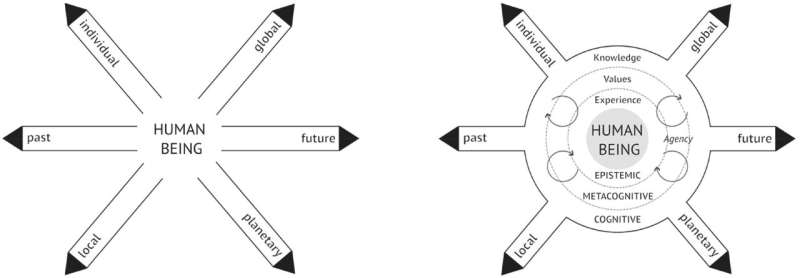This article has been reviewed according to Science X's editorial process and policies. Editors have highlighted the following attributes while ensuring the content's credibility:
fact-checked
trusted source
proofread
Examining how a sustainable future is based on a learning society

Escalating planetary crises, including climate change, the depletion of natural resources and the human-induced sixth mass extinction, pose increasing demands on pursuing a good life. As the planet is reaching its limits, old perceptions of well-being are being questioned.
A holistic transformation is needed for the planet to accommodate people's pursuit of well-being. A new study by an international team of researchers explores a theory of planetary social pedagogy as a driver of a transformative process based on a learning society.
The Theory of Planetary Social Pedagogy is a way of learning applicable to all societal sectors. According to it, people, societies and the world are an interlinked, systemic entity. Such a worldview can make life meaningful, increase people's experiences of belonging and inclusion, expand the scope of care, and help people identify their opportunities to influence.
In a time marked by crises, learning to be one with the world is increasingly essential. In many ways, our everyday lives are linked with all other life on Earth. People are constantly connected to their surrounding reality through, for example, the food they eat and the air they breathe.
According to Professor Arto O. Salonen of the University of Eastern Finland, the study's lead author, the main reason behind the escalating planetary crises is the illusion of people being detached from their surrounding reality.
"As we strive for a comprehensive sustainability transition, we need increasingly robust and more systemic interpretations of reality."
The current political strategy for a sustainable future emphasizes economic and technological progress, but that is not enough. Learning is needed, too. A learning society relies on changes in its citizens' values, beliefs and worldviews.
"How we become aware of our everyday connection to other people and nature at the level of our emotions, body and mind stands at the core of the sustainability transition," says Planning Manager Erkka Laininen of the OKKA Foundation for Teaching, Education, and Personal Development, a co-author of the study. Having an experience of belonging to and being part of the world strengthens people's sense of meaningfulness and their agency needed in building a sustainable future.
The transformative power of a learning society can be a key factor in the green transformation permeating all society, in which citizens' consumer behavior and ways of living, moving and producing food and energy are organized in new ways. Conceptions of work and the economy can be reformed, too.
A sustainable future is not about life becoming more miserable—it's about life becoming richer and more meaningful as hope for the future grows stronger.
The research is published in the journal Educational Theory.
More information: Arto O. Salonen et al, A Theory of Planetary Social Pedagogy, Educational Theory (2023). DOI: 10.1111/edth.12588
Provided by University of Eastern Finland





















